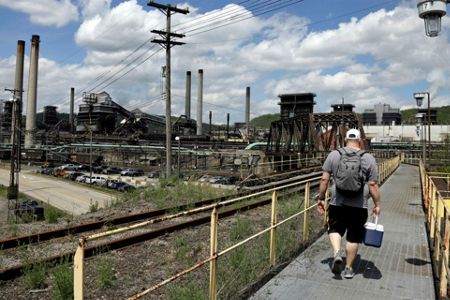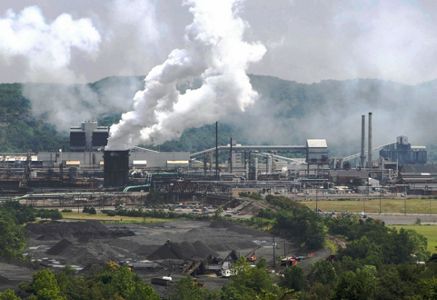The second fire in six months at U.S. Steel's massive coke plant outside Pittsburgh knocked a key pollution control system offline Monday, triggering a health warning as officials monitored the air around the plant for signs of a release of toxic sulfur dioxide.
The Allegheny County Health Department threatened to shut down the plant unless U.S. Steel acts quickly to fix its damaged equipment, while elected officials and environmental groups alike chastised the Pittsburgh-based steelmaker. A Christmas Eve fire in the same area of the plant caused $40 million in damage and significant releases of sulfur dioxide, a pungent byproduct of fossil fuel combustion that can make it hard to breathe.
"I'm very disappointed that this is happening again. People in this community need assurance that the pollution control equipment is reliable and usable," County Executive Rich Fitzgerald, the top elected official in Allegheny County, said in a statement. "I implore U.S. Steel to use all due speed to get this fixed as soon as possible and to take immediate steps to put in a back-up system for their operations. The health of the people of Clairton and surrounding communities, and the U.S. Steel employees, is too important to do otherwise."
U.S. Steel said late Monday it's reviewing the health department's emergency order, which requires it to demonstrate compliance with air emissions limits within three weeks. Company spokeswoman Meghan Cox said crews have made "good progress" toward restoring equipment that removes sulfur dioxide from coke oven gases.
"This matter is a top priority for the company," she said.
Health officials have levied more than $2 million in fines against U.S. Steel since June 2018 over persistent emissions problems at the coke works, the largest facility of its kind in the United States. The plant in Clairton turns coal into coke, a raw ingredient in the steelmaking process.
While the Dec. 24 fire triggered significant releases of sulfur dioxide, health officials said Monday that monitoring equipment had not detected a similar spike from latest blaze. Nevertheless, the elderly, parents of children and people with respiratory conditions "should be aware of the potential for elevated levels of (sulfur dioxide)," the health department said in a statement.
Environmental groups lambasted U.S. Steel for its repeated lapses at the Clairton coke works, pointing to a May 17 incident in which the company reported a large release of 525,000 pounds (238,138 kilograms) of coke oven gas from a pressure release valve. The Breathe Project, an environmental group, said it discovered the release through a search of the U.S. Coast Guard's National Response Center database of discharges of oil, chemicals and other substances.
"There is clear evidence that the problems at this plant have not been resolved and this plant cannot operate under control," said Matt Mehalik, executive director of the Breathe Project.
In the latest incident, U.S. Steel said a small fire in an electrical panel around 4:30 a.m. Monday caused three control rooms to lose power. Though power was restored in one control room, the others, which control the desulfurization equipment, remained without electricity. The company could not immediately say when the desulfurization unit would be operational again, but said in a statement earlier Monday that it was taking steps to "mitigate environmental impacts."
The Pittsburgh-based steelmaker is continuing to deal with significant regulatory and legal fallout from the Dec. 24 fire at Clairton.
Two Pennsylvania environmental groups, PennEnvironment and the Clean Air Council, have filed a federal lawsuit that alleges U.S. Steel violated the Clean Air Act by operating the plant without its desulfurization unit for more than three months. In a separate lawsuit, a woman alleges she suffered headaches, a persistent cough, throat irritation and difficulty breathing. That suit seeks class action status.
"This just adds to a long list of permit violations and air quality issues at the plant," said Matt Walker, community outreach director at the Philadelphia-based Clean Air Council. "Two incidents in that short amount of time should raise serious concern from regulators, elected officials and residents."
U.S. Steel's Clairton facility produces about 4.3 million tons of coke annually to serve its own steelmaking operations and the larger commercial coke market.
Copyright 2019 The Associated Press. All rights reserved. This material may not be published, broadcast, rewritten or redistributed.




